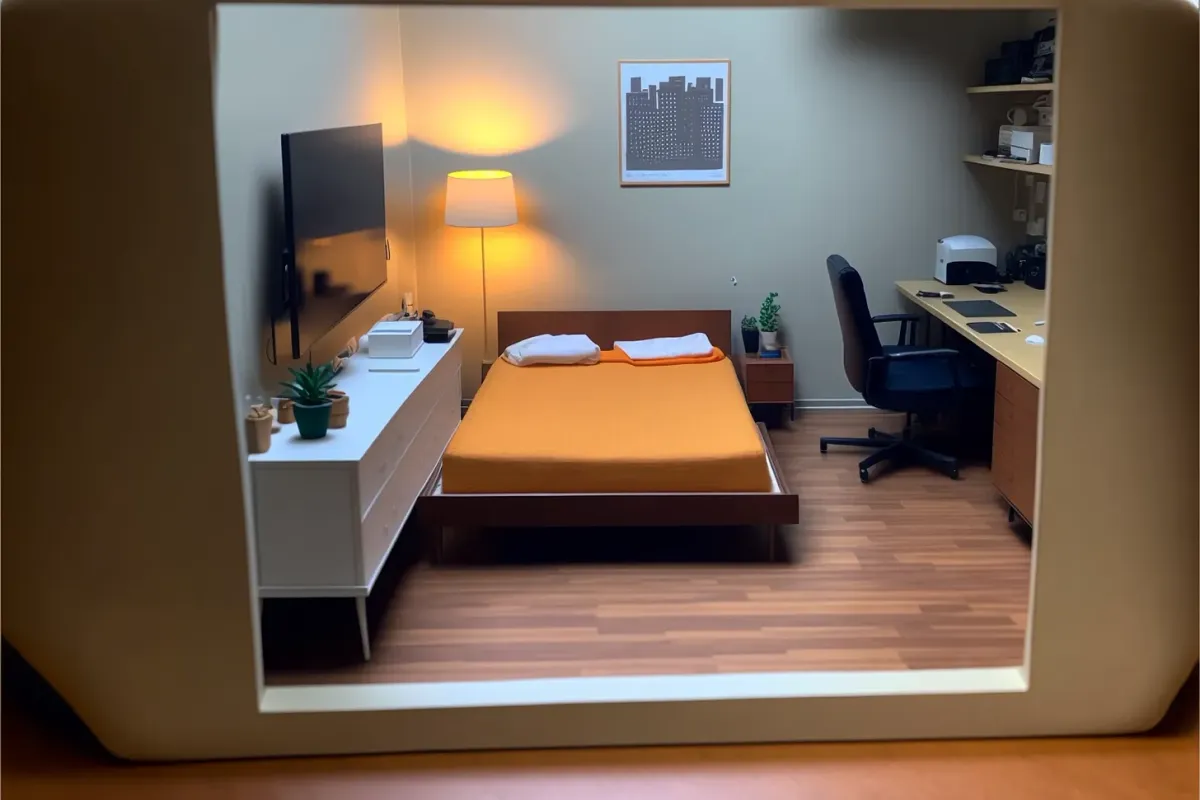This is a rant about beds at work
What about the people at home?

Content Warning: Suicidal ideation briefly discussed.
Last week, Twitter installed bedrooms for employees. They’re expected to be“hardcore” and being hardcore means working too late to go home. And then waking up and working some more. The rooms look like an answer to the alternative history question, “What if IKEA showrooms existed behind a 2022 Iron Curtain?” But they’re really just a reaction to the relative freedom of remote work and an empowered labor force. It’s just another lever to pull when seeking maximum extraction for maximum profit.
People will have to take Musk up on his offer. Many people who work in San Francisco live far outside of it. Bay Area housing prices make short commutes nearly impossible. If the expectation is to work until one in the morning, a two hour round trip commute is just not possible.
A person who cannot rest at home is a person who cannot rest. They cannot have a private moment away from the company. They cannot cry into their pillow, or stretch in the light of the morning. They cannot have coffee at the kitchen table before deciding to walk out the door and go to work again. They cannot feel the weight of someone they love leaning against them on the couch. They cannot hold their child’s hand while they sing a lullaby.
The consequences at an individual level are staggering, but this extends well beyond each employee. To partners, children, roommates, even pets. It matters when a person is pulled from our lives.
What about the partner eating dinner alone, again? What about the chronically ill family member or friend who needs their care? What about the co-parents who have jobs that allow them to be home with the kids? How are they compensated for putting the kids to bed alone, for going to bed alone, for waking up and getting the kids to school alone? What about the impact of that extra care work on their careers? What about the single parents?
What about the kids who don’t get to say goodnight to their mom or dad? What about the toddler who has a nightmare and cries out for his Dad, but he’s not there? In the past, Elon has promised to sleep at Twitter until the company is fixed. Musk often has his 2 year old at the office with him. I wonder how he’d feel about all his employees bringing their toddlers to work.
None of this is surprising. It’s just an exaggerated version of what Silicon Valley has been doing for decades. Musk has only been able to go “hardcore” because when tech needs to make a profit, it extracts from the home first, always. Because it’s free, baby. Sometimes the partner doing all the care work while their spouse works 80 hour weeks get a thank you at the Big Tech Christmas party. Sometimes they don’t.
We’d lived in Oakland for two years the first time I thought about driving my car off the Emeryville overpass.
Diamonds were formed over 100 miles beneath the surface of the earth, under extreme heat and pressure. The diamonds we find on the surface of the earth got there because of volcanic eruptions. Eruptions are a pressure release.
My suicidal ideation was formed miles beneath the surface of Silicon Valley culture, under extreme heat and pressure of being the primary caretaker in a tech-wage dependent home. I stopped driving on overpasses for months at a time, afraid of the eruption that’d crystallize my intrusive thoughts.
By husband worked for a tech company with lots of good policies. They were, in so many ways, the exception to the tech rule. I am grateful for that. But we couldn’t escape the cost of Bay Area tech culture while living in the middle of it. Our home life became small as my husband’s work life became big.
He carpooled to work across the Bay Bridge every weekday. We only lived thirteen miles from his office, but sometimes his commute took two hours. I knew plenty of people who had far longer commutes. We were lucky. He left before the kids woke up for school. Sometimes before I woke up. And he got home after it was dark. Sometimes after dinner was done.
When that happened, I sat alone with the kids, out of conversation and increasingly out of hope. Sometimes I read them picture books while they ate because I couldn’t find any other words. When he got home, he kissed them goodnight and then sat down on the couch and worked some more. We were parents together on the weekends.
It wasn’t just the commute. It was the entire landscape, it had been tech-formed - transformed to sustain tech scalability instead of human life.
It was the housing. The tech-fueled housing crisis was crushing. We spent our first couple years paying $3,300 a month to a slumlord for a molding, crooked house. Friends marveled at the deal we’d found. When we moved out of the house, the homeowner refused to give us back our deposit. He knew we didn’t have the time or money to fight him. Still, we had several friends ask for a link to the rental application, mold and lost deposits were risks they were willing to take.
It was the isolation. I was alone in my work at home. So maybe it would have helped to find community in work outside the home. We’d hoped I could get a job when we got to Oakland. But I don’t have a degree. The jobs I was qualified for paid far less than the cost of childcare. And we were already not making enough money to pay our bills on time every month. There was no clear path to fixing the problem because getting a degree required childcare too.
It was the family. We had three children by the time we were 32. We were trying to make our multigenerational family work in a landscape increasingly hostile to families of any composition. My mom moved in with us shortly after my dad died. She worked full-time at a furniture store an hour away, making just enough to pay for her insurance and medication. We needed extra room for her but every extra square foot listed at an average of $575. And most sellers only considered majority-cash offers, several hundred thousand over the list price.
It was the rage. While I googled ways to stop mold from creeping up through our floors and walls, my husband worked in an office featured in design magazines. When I blanched at the price as our groceries were rung up each week, he had catered lunches and fridges full of drinks in glass bottles. While I steeled myself for the smug reaction each time I told someone I was a stay-at-home mom, his role at a swiftly rising startup gave him immediate credibility with new people.
It was the money. I remember calling my husband, angrily crying after I’d had another hard morning with the kids. He was still on his way to work. The people in the car probably heard me sobbing over the phone as I wailed. I’d just read an article that said the Bay Area’s tech-fueled high cost of living meant a family of four on an income higher than ours was low-income. We were a family of five, plus my mom. And we made good money, anywhere else in America. How could anyone survive?
A friend once said that living in the Bay Area was like trying to breathe through saran wrap. None of this is against Oakland. I loved Oakland. I still love Oakland. It’s my favorite place in the world. This was all being done to Oakland, too.
When we moved to Denver in 2019, we made sure my husband had a much shorter commute. He worked for the same good company, but everything else was different. We could afford part-time childcare for the first-time. And then when the pandemic started, he began to work remotely. Between our childcare and the flexibility of his remote work, I was able to start my writing career in 2020. Our home life expanded and filled our lives in a way we’d never experienced. I stopped thinking about driving off overpasses. Remote work has its own set of problems. But he’s there every morning, when the kids get out of bed.
I might be thinking about beds because I’ve been stuck in one for the past couple days. I am writing this from bed! I got food poisoning Sunday night. Definitely going to blame the McDonald’s cheeseburger. I ate it while I sat at my kids’ Sunday afternoon dress rehearsal for their evening performance of The Nutcracker.
We’d just finished watching the ballet when I realized I needed to be in my bathroom, immediately. I drove home, breathing through gritted teeth, praying I would have to stop the car and puke on someone’s inflatable Santa Clause. There’s no coming back from vomiting on a yard ornament. Luckily, I made it home with my dignity.
The night that followed was….harrowing. I was so sick, I hallucinated. The last time that happened I was a four year old with chicken pox. At one point, I couldn’t figure out why my dad hadn’t checked on me yet. He was the parent that always took care of us when we were throwing up. I didn’t remember till early in the morning that I am grown now and he is dead. I slept most of the day yesterday. When I tried to stand, I fainted.
My husband got the kids to and from school, took care of one mid-lunch school heartbreak phone call, made dinner and got the kids to bed. He brought me ginger ale, tylenol and crackers. He was able to do all that because he still mostly works remotely.
I don’t remember getting food poisoning in Oakland, but there were plenty of reasons to be in bed then too. Some were bad. Influenza A, pneumonia, shingles and the miscarriage. My husband worked across the bridge for all of those moments. Some were good. Like mornings when the kids climbed in our bed. He was gone for that five days a week.
And nights when it was ummmm just grown up time? I was up for it when I didn’t hadn’t spent the day trying to keep myself from driving off bridges. Which was less and less often.
I guess what I am trying to say, through my food poison recovery haze, is that a bed is never just a bed.
As the Fed continues to raise rates, the labor market will weaken. As labor loses power, we’ll see more beds in office buildings. Enough people with enough money like what Elon is doing. They’ll start building offices zoned for mixed use. The offices will have overnight sleeping pods, they’ll also be smaller as they want to employ fewer people. They’ll automate as much as they can.
When Musk fired Twitter’s janitorial crew, the BBC reported that, “a member of Elon Musk's team had said their jobs would be replaced by robots.” Musk seems to think everything but coding can be done by robots. Which is…interesting. And worth unpacking, probably. And for the work that they don’t really value but cannot automate, they’ll build apartments equipped to cater to, and data mine, remote workers. Isn’t that all Adam Neumann has proposed so far?
Offices with beds, beds with offices. Always at work, never at home.

